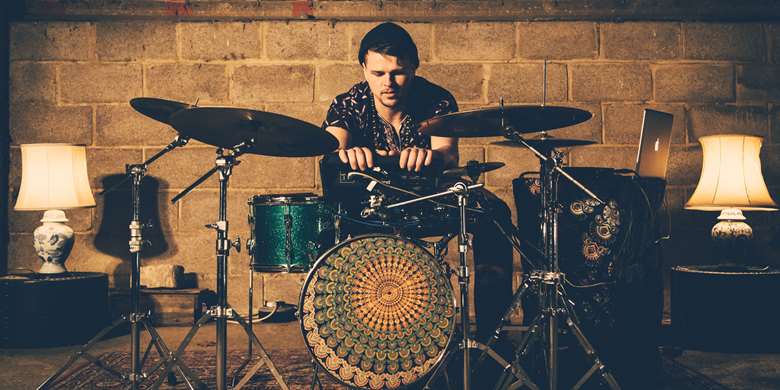Tim Doyle (aka Chiminyo): “not many people get to go on stage by themselves and say, this is me”
Nick Hasted
Wednesday, December 11, 2019
Drummer Tim Doyle can often be caught scattering rhythms for such London operatives as Maisha and Cykada but, as our own Nick Hasted discovered, it’s with his Chiminyo solo project, with its software patches and sequencer patterns, that Doyle really gets to express himself

Tim Doyle is building a private musical universe around his drums. Under the name Chiminyo, he is a one-man band of a new, cyborg kind. Contact mics attached to his drums and cymbals mean each hit sends signals to his laptop, which are sequenced by software patches; every hit of his kick-drum, for instance, might move to the next note in a bassline sequence. As new tunes and phrases are added a musical network is growing around Doyle’s kit, where he has rhythmic liberty in deploying his panoply of sounds. Debut single I Am Chiminyo demonstrates the glistening techno textures and warped sitar riffs which can result. Those who saw Chiminyo’s late-night Love Supreme set – during a festival when Doyle also played percussion with Maisha and drums with Cykada’s polyglot London sounds – experienced this complex creation’s euphoric results.
“If I’m vibing with a crowd, like I was at Love Supreme,” Doyle tells me on the phone before a Maisha gig in Italy, “I’ve got a filter which takes all the high-end out, so it sounds underwater and quiet. So I can play really crazy, then take the filter out and come in harder, completely on the fly. It makes for a more vibrant experience with the audience.”
Doyle’s experiments began when he noticed a mysterious input on a vintage Prophet-6 synth, plugged a drum trigger in, and stumbled on a world of possibility. Three months’ recuperation from a kidney operation let him dig further. “I was at my parents’ house, on heavy opiates,” he recalls. “I used that time to learn piano, and build my own software patches. And now I’m putting all my spare time into developing my ideas. It’s a crazy, outrageous amount of work. But I’ve started down the rabbit-hole. I can’t turn around now. And not many people get to go on stage by themselves and say, this is me.”
Using debilitating illness to study piano and coding skills typifies Doyle’s all-out approach to life. “My friends comment on my work ethic,” he concedes. “On my year out, I played with three orchestras. And when I decided to explore percussion, I bought congas, and played in nightclubs with a DJ when I was 18. They used to call me Bongo Tim! Once I’ve got a concept, I see it through.”
Doyle sounds not so much a generalist as a universalist – grabbing everything in his reach. “Yeah, man, you should go to my house!” he laughs. “I’ve got a studio in my garden that we built in a shed. Now I’ve got three drum-kits, a darbuka from Egypt, a Greek bass-drum, five different kinds of frame-drums from Iran, Turkey and Italy. And I travel quite lot. I’ve just been to Morocco, and studied and played there. I take all opportunities.”
Doyle became interested in jazz aged 16. By 18, he was determinedly studying it five hours a day between call-centre shifts. “The things I’ve taken from jazz are interaction, spontaneity and communication,” he considers. “I really enjoy being on the stage with musicians who I get on with socially. It’s like sitting in a bar with someone and getting through a bottle of whiskey and just chatting freely the whole night. Ideas shift, and perspectives change.”
Doyle grew up in the idyllic Hampshire town of Ringwood, which when I visited it once seemed the epitome of pretty Middle England. It’s not the most obvious background for such a borderless soul. “I wouldn’t recommend being me there now,” he says. “I would have loved a bit more diversity, I guess, and different ideas.” As if on cue, he bursts into something resembling Italian to a passerby. “I’m a very open person,” he continues, pondering why his music is so wide-ranging. “Like here in Italy, I don’t speak a word of Italian – but I try to. In Senegal, I communicated in gestures and awful Wolof, and made loads of friends. I’m open to making a fool of myself. That’s maybe part of it.”
Visions of a future playing to jazz’s often sedentary, older audiences meanwhile pushed Doyle away from it at college, seeking out West African, Jewish and Turkish music to make audiences his own age dance. Jazz’s own renewed ability to do just this reached a remarkable climax for him when this year’s Glastonbury festival programmed the Wormhole, a late-night stage purely for Britain’s new jazz scene, where Cykada were followed by free-form sound-clashes with The Comet Is Coming, Ezra Collective and others. “It was the popping-est, freshest thing at Glastonbury, of all places,” he recalls of the wondrous scene… "I go on this escapade of discovery, and then suddenly, the jazz scene’s actually doing what I need it to. I’m counting my blessings.”
One more thing stands out about Tim Doyle when he plays: his constant grin. “I remember my brother saying that he loves the smile that I get when I play,” he reflects. “You don’t see it that much with UK musicians. But in Senegal, those guys will be beaming. I don’t want to lose sight of that. I can’t think of anything more important than experiencing that joy and adrenalin.”
This article originally appeared in the September 2019 issue of Jazzwise. Never miss an issue – subscribe today!